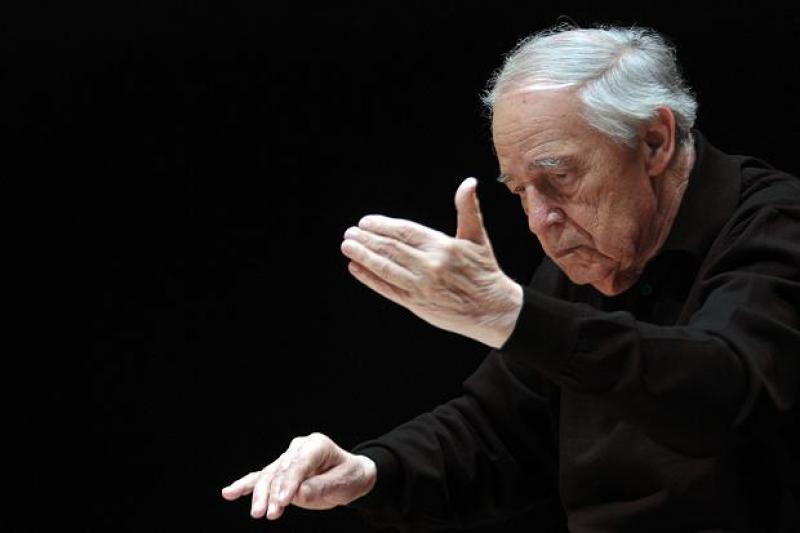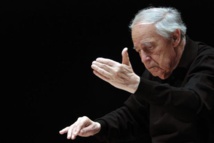It was not that he disdained opera, but rather Boulez, who died Tuesday in Baden-Baden, Germany, felt that operatic productions had become too amateurish and catered too much to popular demand.
"He helped open minds and hearts to new musical forms," said France's former culture minister Jack Lang. "He really invented a unique musical language."
Intrigued by maths, Boulez composed around 30 often demanding works, notably "Le Marteau Sans Maitre" (The Hammer Without a Master), which drew inspiration from surrealist poetry.
Several works he labelled "works in progress" were to be modified as the performer desired.
"He was a central player in the forward march of the music of our era, the music that... we would be playing tomorrow," said Stephane Lissner, director of the Paris Opera.
Boulez conducted some of the world's top orchestras, leading the BBC Symphony Orchestra and the New York Philharmonic, where he was musical director from 1971 to 1977.
Top US orchestras on Wednesday dedicated performances to Boulez.
Alan Gilbert, his successor as music director at the New York Philharmonic, described him as a "towering and influential musical figure whose Philharmonic leadership implicitly laid down a challenge of innovation and invention that continues to inspire us to this day."
Boulez's conducting style was legendary. Shunning the baton in favour of his hands, he used sharp, clear movements reminiscent of a traffic director.
Lissner, of the Paris Opera, called Boulez "one of the greatest composers of the 20th century" who had "left his mark on his era."
- 'He thought with his heart' -
Born on March 26, 1925 in the Loire Valley town of Montbrison, Boulez studied at the Paris music conservatory with Olivier Messiaen, a leading composer and organist who influenced his early works.
Boulez's brusque statements added to his public image.
In 1952, he wrote an essay titled "(Arnold) Schoenberg Is Dead", vowing to take music to the next frontier a year after the death of his forerunner in atonality -- music that abandons classical scales.
"That means 'stop linking my generation to his discoveries and experimentations, we have gone past that'," said Laurent Bayle, director of the Philharmonie de Paris and a disciple of Boulez.
Boulez was invited by orchestras from Berlin and Vienna to Chicago and Cleveland, and despite his comment on opera, produced in the late 1970s a celebrated version of Richard Wagner's "The Ring of the Nibelung" with French director Patrice Chereau.
It was his exasperation with the relative conservatism of the French musical world that led him to make his home in the German city of Baden-Baden before heading to London and New York.
He returned however in 1974 to create an ensemble dedicated to contemporary music and the Institute for Acoustic/Music Research and Coordination.
He was the first musician named to the College de France, a prestigious research and teaching institute founded in the 16th century.
From there he was associated with several major musical projects such as the Cite de la Musique, inaugurated in 1995, and most recently the Philharmonie de Paris, whose inauguration last year he was too frail to attend.
Musicians worldwide have offered their remembrances of his singular talent in modern conducting and composing.
Julian Lloyd Webber, the principal of Britain's Birmingham Conservatoire, tweeted: "Even if you didn't whistle his oeuvres in the bath he certainly moved and shook!"
"He felt with his head and thought with his heart," said Argentinian conductor and pianist Daniel Barenboim.
-------------------------------------------------------------------------------------------------------------------
"He helped open minds and hearts to new musical forms," said France's former culture minister Jack Lang. "He really invented a unique musical language."
Intrigued by maths, Boulez composed around 30 often demanding works, notably "Le Marteau Sans Maitre" (The Hammer Without a Master), which drew inspiration from surrealist poetry.
Several works he labelled "works in progress" were to be modified as the performer desired.
"He was a central player in the forward march of the music of our era, the music that... we would be playing tomorrow," said Stephane Lissner, director of the Paris Opera.
Boulez conducted some of the world's top orchestras, leading the BBC Symphony Orchestra and the New York Philharmonic, where he was musical director from 1971 to 1977.
Top US orchestras on Wednesday dedicated performances to Boulez.
Alan Gilbert, his successor as music director at the New York Philharmonic, described him as a "towering and influential musical figure whose Philharmonic leadership implicitly laid down a challenge of innovation and invention that continues to inspire us to this day."
Boulez's conducting style was legendary. Shunning the baton in favour of his hands, he used sharp, clear movements reminiscent of a traffic director.
Lissner, of the Paris Opera, called Boulez "one of the greatest composers of the 20th century" who had "left his mark on his era."
- 'He thought with his heart' -
Born on March 26, 1925 in the Loire Valley town of Montbrison, Boulez studied at the Paris music conservatory with Olivier Messiaen, a leading composer and organist who influenced his early works.
Boulez's brusque statements added to his public image.
In 1952, he wrote an essay titled "(Arnold) Schoenberg Is Dead", vowing to take music to the next frontier a year after the death of his forerunner in atonality -- music that abandons classical scales.
"That means 'stop linking my generation to his discoveries and experimentations, we have gone past that'," said Laurent Bayle, director of the Philharmonie de Paris and a disciple of Boulez.
Boulez was invited by orchestras from Berlin and Vienna to Chicago and Cleveland, and despite his comment on opera, produced in the late 1970s a celebrated version of Richard Wagner's "The Ring of the Nibelung" with French director Patrice Chereau.
It was his exasperation with the relative conservatism of the French musical world that led him to make his home in the German city of Baden-Baden before heading to London and New York.
He returned however in 1974 to create an ensemble dedicated to contemporary music and the Institute for Acoustic/Music Research and Coordination.
He was the first musician named to the College de France, a prestigious research and teaching institute founded in the 16th century.
From there he was associated with several major musical projects such as the Cite de la Musique, inaugurated in 1995, and most recently the Philharmonie de Paris, whose inauguration last year he was too frail to attend.
Musicians worldwide have offered their remembrances of his singular talent in modern conducting and composing.
Julian Lloyd Webber, the principal of Britain's Birmingham Conservatoire, tweeted: "Even if you didn't whistle his oeuvres in the bath he certainly moved and shook!"
"He felt with his head and thought with his heart," said Argentinian conductor and pianist Daniel Barenboim.
-------------------------------------------------------------------------------------------------------------------









 Home
Home Politics
Politics











